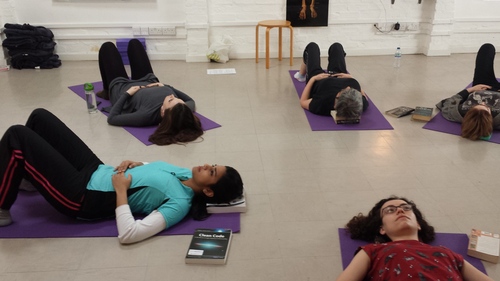Caring for the Carers with the Alexander Technique
This is Carers Week in the UK and it is great to draw people’s attention to the fact that carers very often get little support for what is often a lonely, stressful, challenging and exhausting activity. The Carers Week Website cites some research that shows that, as a result of their caring responsibilities, 84% of carers felt more stressed, 78% more anxious and 55% experienced depression (State of Caring 2015). It can be tough being a carer!
Some years ago I ran ‘Stress and Relaxation‘ and ‘Caring for the Carers‘ courses in Adult Education Colleges and I was made very aware of just how difficult a life it can be for carers and how isolated they can feel. Unfortunately, carers often spend so much time caring for others that they forget to look after themselves – or even feel that they have no right to look after themselves or have time off – and this can result in their getting exhausted, unable to cope, angry, resentful, anxious, depressed or ill. Back problems are also a frequent outcome from lifting inappropriately, or from experiencing high levels of stress and tension. None of which is good for the carer, or good for the person being cared for.
There are also many people who work in caring professions and locally, there are lots of charity workers who also tend to put other people and their needs first.
“It’s Selfish to Put Myself First” – NOT NECESSARILY!
Have you ever travelled by plane and listened to the Pre-flight Safety Instructions? If so, you will have heard that it is important to put your own oxygen mask on first, before putting one on anyone else who needs assistance. People accept that idea on a plane but are often less happy to think that way at home, even though the same dynamics are true in the rest of life – you will help others far better when you look after yourself and avoid putting yourself at risk or making yourself ill from overwork.
Sometimes that means putting yourself first, for a change.
So how can the Alexander Technique help?
The AT is a wonderful tool that you can use throughout your life. Once you have learned how to use the AT during your daily activities it can, for instance, help you to cope with stressful situations, calm yourself, reduce tension and avoid injuries.
The most obvious tool you can use is the Lying Down or Constructive Rest Procedure and this can quickly help you to unwind and rejuvenate yourself, so that you can proceed with the next part of the day’s activities from a calmer and more centred place in yourself. It is also great at helping you to reduce tension and back pain.
These women were learning how to use the active rest procedure in an Intro Workshop on International Women’s Day 2015.
Calm ~ Mindful ~ Unwinding ~ Centred ~ Freeing-up ~ Alert ~ Calm
STOP and Count to Ten
There are many other less obvious ways in which the AT can help us cope with difficult situations. For instance, the old technique of ‘stop and count to 10‘ is familiar to many as a useful anger management technique. More subtle but similar, is the Alexander Technique use of inhibition. With this we learn to stop briefly in order to avoid rushing into a habitual reaction to something, so that we can more thoughtfully choose how we want to respond. (This process is a lot quicker than counting to 10!)
Inhibition can be applied to avoiding all sorts of habits, from tightening our neck muscles as we rise out of a chair, saying ‘no’ to shouting at someone, to reacting with tension as we begin to use a computer – or even in reaction to just thinking of using one. When we are aware, we can notice all sorts of habitual reactions to both the outside world and also to our own internal thoughts. Once we have noticed them, we can learn to have more choice about whether or not we react habitually, or choose to respond differently.
Stress
Some situations are extremely stressful and we may have little chance to change things. However, we do have some choice as to how we react to stress and this can be invaluable in helping all of us, not just carers, to cope with the difficulties and challenges that are in our lives. We can use the AT as we travel on crowded transport, deal with a screaming child or try to unwind after a day’s work… you name the stress and using the AT will probably help you with it.
For instance, a pupil told me that using the Alexander Technique helped her to remain calm, still and relaxed, when cooped up in the machine to have an MRI scan, despite having thought she would feel claustrophobic in it.
Once we learn the Alexander Technique, we can use the AT during all our activities, every day. In so doing we can feel less helpless in the face of stress, because we know we have a tool we can use to help ourselves and to take care of ourselves in many, many different situations.
